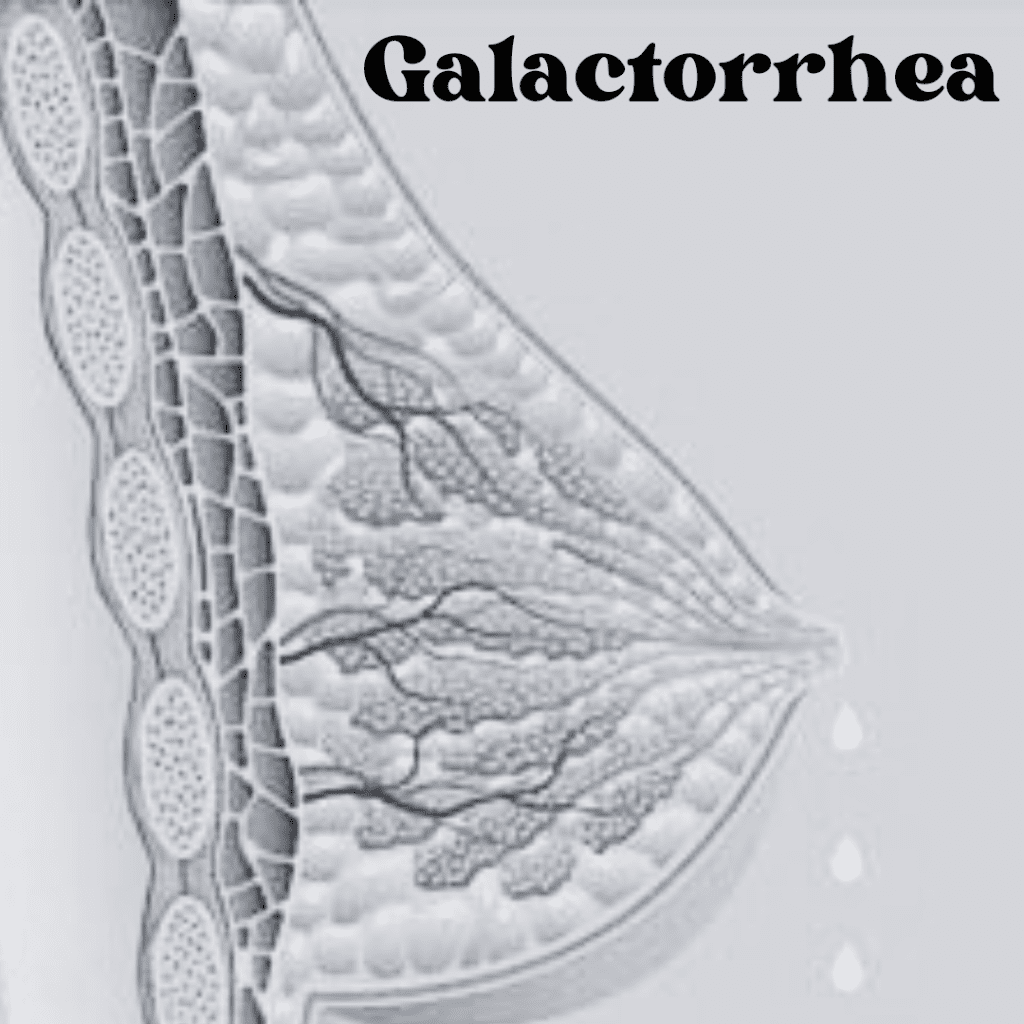Galactorrhea: A Closer Look

Galactorrhea, a condition characterized by the spontaneous flow of milk from the breast, is a phenomenon that can occur in people of all genders. While it may not always indicate a serious underlying problem, it can be a cause for concern and discomfort. In this blog post, we will explore the causes, symptoms, and treatment options for galactorrhea, shedding light on this often misunderstood condition.
What is Galactorrhea?
Galactorrhea is a medical condition in which there is a spontaneous flow of milk-like substance from the breast, unrelated to breastfeeding or childbirth. This condition can affect individuals of all ages and genders, although it is more common in women.
Causes of Symptoms of Galactorrhea
Here are some of the common factors that can lead to galactorrhea:
- Hormonal Imbalance: An imbalance in hormone levels, particularly elevated levels of prolactin (the hormone responsible for milk production), can lead to galactorrhea. This hormonal disruption can occur due to various factors, including pituitary gland disorders, medication side effects, and certain medical conditions.
- Medications: Some medications can disrupt the body’s hormonal balance and lead to galactorrhea. Common culprits include certain antipsychotic drugs, antidepressants, antihypertensive medications, and oral contraceptives. If you suspect a medication is causing galactorrhea, consult your healthcare provider to discuss potential alternatives.
- Pituitary Gland Disorders: Tumors or other abnormalities in the pituitary gland, a small gland located at the base of the brain that controls various hormones, including prolactin, can lead to galactorrhea. These tumors can affect hormone regulation, resulting in elevated prolactin levels.
- Thyroid Disorders: Both hypothyroidism (an underactive thyroid) and hyperthyroidism (an overactive thyroid) can disrupt the body’s hormonal balance and potentially cause galactorrhea.
- Chronic Kidney Disease: Kidney dysfunction can lead to electrolyte imbalances in the body, which, in turn, can affect hormone levels and potentially trigger galactorrhea.
- Nipple Stimulation: Excessive nipple stimulation, such as frequent rubbing or manipulation of the breasts, can lead to galactorrhea. This is often observed in cases of sexual activity or clothing friction.
- Pregnancy and Breastfeeding: Galactorrhea is a normal occurrence during pregnancy and breastfeeding. In these cases, it is not considered a medical condition but a natural part of the reproductive process.
- Stress and Emotional Factors: Emotional stress or psychological factors can sometimes lead to galactorrhea, particularly if they disrupt hormone regulation. Reducing stress and practicing relaxation techniques may help alleviate this form of galactorrhea.
Symptoms of Galactorrhea
Apart from the obvious symptom of spontaneous breast milk discharge, individuals with galactorrhea might experience:
- Nipple Discharge: The most obvious and common symptom of galactorrhea is the discharge of milky fluid from one or both nipples. The discharge can be white, milky, clear, yellow, green, or even bloody.
- Breast Tenderness and Swelling: Many individuals with galactorrhea experience breast tenderness and swelling. The breasts may feel sensitive and sore.
- Irregular Menstrual Periods: Galactorrhea can sometimes be associated with irregular menstrual cycles, including missed periods or changes in menstrual flow.
- Changes in Libido: Some individuals may experience changes in sexual desire or libido due to hormonal imbalances associated with galactorrhea.
- Headaches and Vision Changes: Galactorrhea caused by pituitary gland disorders or tumors might be accompanied by headaches, especially in the frontal or temporal regions, and vision disturbances. These symptoms can include blurred vision, double vision, or loss of peripheral vision.
- Vaginal Dryness: Hormonal imbalances related to galactorrhea can lead to changes in vaginal moisture levels, causing discomfort or pain during intercourse.
- Infertility: In some cases, hormonal disturbances associated with galactorrhea can affect fertility, making it difficult for individuals to conceive.
- Changes in Body Hair: Hormonal imbalances might cause changes in body hair patterns, leading to increased facial or body hair in women (hirsutism).
- Skin Changes: Hormonal imbalances can also lead to changes in skin texture, such as increased oiliness or acne.
It’s important to note that not all individuals with galactorrhea will experience all of these symptoms, and the severity of symptoms can vary widely. Additionally, some individuals may have galactorrhea without any noticeable symptoms other than the discharge itself.
Diagnosis and Treatment
Diagnosis and treatment of galactorrhea involve a series of steps to identify the underlying cause and address the condition effectively. Here’s an overview of the typical diagnostic and treatment process:
Diagnosis:
- Medical History and Physical Examination: The initial step in diagnosing galactorrhea involves taking a detailed medical history. Your healthcare provider will ask about your symptoms, medical history, medications you’re taking, and any relevant family history. A physical examination, including a breast examination, will be performed.
- Hormone Level Testing: Blood tests will be conducted to measure hormone levels, particularly prolactin. Elevated prolactin levels are often a key indicator of galactorrhea.
- Thyroid Function Testing: Thyroid function tests may be done to assess thyroid hormone levels. Thyroid disorders can contribute to hormonal imbalances that may lead to galactorrhea.
- Imaging Studies: If necessary, imaging studies such as magnetic resonance imaging (MRI) or computed tomography (CT) scans may be performed to assess the pituitary gland and rule out structural abnormalities.
- Medication Review: A review of the medications you are currently taking or have recently taken is essential. This is because certain medications, such as antipsychotics or antidepressants, can be a potential cause of galactorrhea.
Treatment:
The choice of treatment for galactorrhea depends on the underlying cause. Here are some common treatment options:
- Medication: If elevated prolactin levels are identified as the cause, medications called dopamine agonists (e.g., bromocriptine, cabergoline) are often prescribed to lower prolactin levels. These drugs can effectively reduce or eliminate the symptoms of galactorrhea.
- Hormone Replacement Therapy: In cases where galactorrhea is associated with other hormonal imbalances, hormone replacement therapy (HRT) may be recommended to restore hormonal balance.
- Adjustment of Medications: If a specific medication is identified as the cause of galactorrhea, your healthcare provider may consider adjusting the dosage or switching to an alternative medication that does not have the same side effect.
- Treatment of Underlying Conditions: If galactorrhea is related to an underlying medical condition, such as a pituitary tumor, treatment may involve surgery, radiation therapy, or other interventions to address the primary issue.
- Lifestyle and Dietary Changes: In some cases, adopting a healthy lifestyle, including managing stress, engaging in regular exercise, and maintaining a balanced diet, can help regulate hormone levels and improve overall well-being.
It’s important to note that early diagnosis and treatment are essential for a better prognosis, especially when an underlying condition is present. Additionally, ongoing monitoring and follow-up with your healthcare provider are typically recommended to ensure the effectiveness of treatment and address any changes in symptoms.
If you or someone you know is experiencing galactorrhea or related symptoms, seeking prompt medical evaluation is crucial. Healthcare professionals can provide a personalized assessment and treatment plan to address the specific underlying cause and alleviate the symptoms of galactorrhea.
Disclaimer
Please note that the information provided in this blog post is for informational purposes only and should not be considered a substitute for professional medical advice. If you suspect you have galactorrhea or are experiencing symptoms related to this condition, it is essential to consult a healthcare provider for a proper evaluation and diagnosis. Treatment options may vary depending on individual circumstances, and a healthcare professional can provide personalized guidance based on your specific situation.
Stay updated—subscribe now for informed empowerment!

